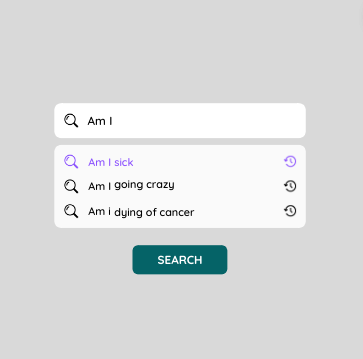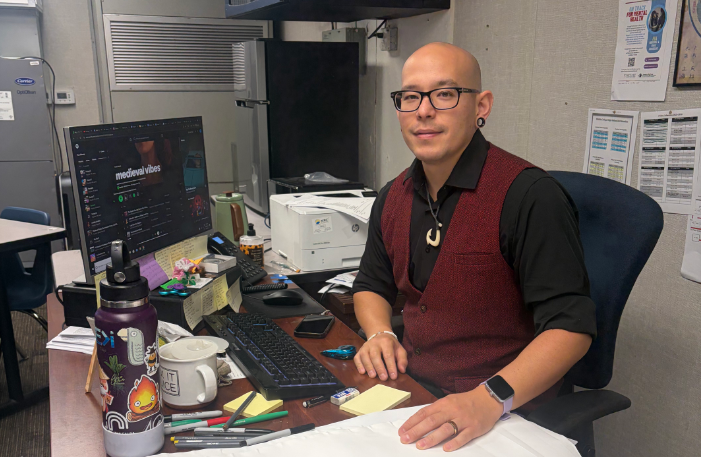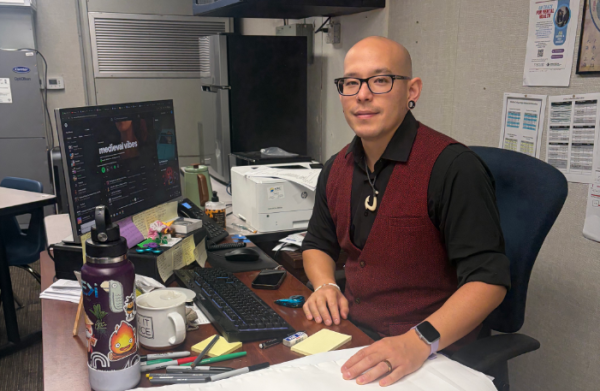Hypochondriasis: Living with health anxiety

Made with Canva by Kimberly Lopez
Hypochondriacs search up their symptoms constantly which can worsen their mental state.
Imagine you start having visual disturbances and a painful headache. You look up your symptoms and decide you’re going blind. You find out you have glaucoma and it’s only going to get worse. In reality, you’re just having a migraine.
Many people have heard about general anxiety, but not many people know about health anxiety. Health anxiety, also known as hypochondriasis is a condition where someone is excessively worried they may be sick when there aren’t any physical symptoms.
Registered Nurse Laura Avalos said, “A hypochondriac is a super anxious person that believes they are sick when they’re not.”
When a hypochondriac is having an episode they can turn to the internet and find information that sends them spiraling. Around 70% of adult Americans use the internet for medical information. Utilizing the internet in this way can cause someone to develop cyberchondria which according to GoodTherapy, is a person’s anxiety about their health that is created or exacerbated by using the internet to search for medical information.
Avalos said, “The internet gives a very wide range of reasons why you have symptoms. You’re either dying or you’re fine.”
Though the internet can be harmful for hypochondriacs, it can still be helpful for others.
Nurse Practitioner Jay Lardizabal said, “The internet is a double edged sword. It can either help patients make the right decision to seek appropriate medical or psychiatric help, or worsen their hypochondriasis with even more anxiety.”
COVID has impacted health anxiety.
In the beginning of the pandemic nobody really knew what was going on. We were advised to wear masks, then to not wear masks, then to panic, and then to stay calm. All we knew was that people were in the hospital dying because of COVID.
COVID has created health anxiety for some people and worsened it for others. It is more likely that we can become sick anytime we leave the house and we haven’t been able to forget that for the past two years.
Lardizabal said, “I think COVID made peoples anxieties go up, especially those with hypochondriasis. COVID’s signs and symptoms are vague, very similar to viral respiratory infections, so if anything, these patients are more proactive and must have gotten all the needed immunizations to prevent getting infected. It’s a good thing.”
Avalos said that since healthcare professionals didn’t know what they were dealing with at first, the media exaggerated some things which could cause higher anxiety levels for everyone. She said, “It’s the unknown that always causes fear.”
Hypochondriacs genuinely believe that they are sick; they don’t fake their anxiety for attention. The important thing to note is that sometimes their feelings don’t have a medical basis.
People with hypochondriasis can have trouble accepting that healthy people can have symptoms of illnesses but not have an illness. It is common for hypochondriacs to believe that the worst possible scenario is happening when in actuality their symptoms might be minimal to nonexistent. Even common feelings: a headache, a stomachache, or soreness can make them convinced they are seriously sick.
Constantly checking for symptoms can make someone obsess over sensations they would normally ignore. When you become preoccupied with bodily sensations, those sensations become amplified and last longer. This intensive cycle can restart any new thought or symptom.
Sometimes Lardizabal sees hypochondriacs. He said, “Although hypochondriasis anxieties are unwarranted, we don’t immediately discount patient concerns. Sometimes we still run labs and imaging as these may be valid complaints.”
Not every hypochondriac is the same. There are different anxiety levels when it comes to health.
Lardizabal said, “Some are mild and some are severe. Patients usually report insomnia, difficulty concentrating, worrying too much because of thoughts about having a serious medical illness– usually concerned they have cancer. Patients often request for a lot of lab and imaging tests although these tests are really not indicated.”
Avalos also sees hypochondriacs.
She said, “I see hypochondriacs all the time. They have untreated anxiety or are WebMD searchers and uneducated people usually. They don’t know how to care for themselves so they look for answers on the internet.”
The excessive anxiety hypochondriacs experience can cause severe distress that can disrupt their life.
Lardizabal said, “If the anxiety is persistent and disrupting daily activity, it must be managed by professionals.”
Hypochondriasis can develop in people who struggle with depression or anxiety, have lost loved ones from medical issues, had a serious illness in childhood, or mothers with newborn babies. If someone had a parent who worried about their own health excessively, they can develop it too. This can be a learned behavior and something people can be genetically predisposed to.
Illness anxiety can develop in someone’s 20s or 30s and it affects men and women the same.
Lardizabal said, “It’s unknown but risk factors include high stress level, a recent death due to an illness in the family, OCD, family history of hypochondriasis, anxiety disorder, bipolar disorder, among others.”
Illness anxiety can harm relationships if the person with hypochondriasis excessively seeks reassurance about their health or avoids their relationships completely. Along with avoiding people, hypochondriacs may avoid places out of fear they will catch something.
In direct message interviews with the Spellbinder, Reddit users shared personal stories about their hypochondriasis.
Pchscone, a 21-year-old Reddit user from Indiana struggles with hypochondriasis. Her sister and boyfriend are hypochondriacs too. When Pchscone feels a new sensation or pain, she panics.
She said, “I don’t have an official diagnosis for it but I do meet a lot of the criteria. I have agoraphobia and generalized anxiety disorder along with health anxiety. I struggle with it on a daily basis at least as of recently.”
Pchscone has had an episode where she thought the worst possible situation was happening.
She said, “About a month or so ago, I was having pretty extreme heart palpitations and a high heart rate that led to some chest pain. I panicked and of course convinced myself that I was having a heart attack or some other heart problem. I went to the ER and had an x-ray, EKG, and even wore a heart monitor for 7 days but it turned out everything was fine and I later figured out I was having some adverse side effects from an anti-anxiety medication I had started about a month earlier.”
Pchscone’s hypochondriasis started as a result of a medical trauma.
She said, “I had my gallbladder removed a couple years ago and I think that hospital visit really traumatized me because I never had to have a surgery before so maybe that triggered it. It only got bad recently because my anxiety started to manifest into physical symptoms rather than just the mental stuff.”
In the past she would go to her mother asking to go to a doctor or the ER. Now, she can calm herself down and realize nothing is wrong. Avoiding the internet is important for her because googling obsessively can worsen the thoughts.
To overcome her hypochondriasis, Pchscone has started therapy to manage her anxiety.
An anonymous Reddit user from Georgia shared their experience with hypochondriasis. Their hypochondriasis started around the age of 10 and they only recently became aware they suffer from it. Their mom is a hypochondriac too.
Their triggers can be unpredictable. They said, “It can be random things. From simply just overthinking or something affecting someone else and I become afraid that it will happen to me.”
Usually they have mild episodes that last a week. Those are normally in between extreme episodes that can last up to two years.
Just like their triggers, the severity of their episodes can be unpredictable. They shared an extreme episode.
“I saw a video of a child with cancer and I lived as if I had cancer, constantly reminding myself that I was going to pass away. Then a week later my childhood friend passed away from cancer which made everything really extended,” they said.
This anonymous Reddit user feels like their toxic home environment contributes to their hypochondriasis. Their tendency to overthink and have to bottle everything up perpetuates it.
Now, they are facing their hypochondriasis with the help of their partner.
Maintaining control is difficult but they have changed their thought pattern.
They said, “I remind myself that what I’m thinking only happens to people with hypochondriasis which is why I think the way I do. For a long time I thought everyone had these thoughts so telling myself that I’m making it up helps a lot.”
The internet can worsen their hypochondriasis.
They said, “It makes it worse. I’ll scroll on TikTok and see someone with a disorder or illness and I’ll start to make myself believe I’ve somehow contracted the same illness as them, especially when they say their symptoms. I’ll make myself imagine how their symptoms feel and that makes me begin to feel the ‘symptoms.’”
Hypochondriasis isn’t something that can just go away.
They said, “Just because you’re aware of being a hypochondriac doesn’t mean it’ll stop. It helps when I remind myself the reason I think the way I do is because of hypochondria but the overthinking still happens. It doesn’t just stop. I’m only able to reassure myself that whatever is happening isn’t reality.”
Senior Alejandro Prado has hypochondriasis episodes at least once a month. His grandmother struggles with it in the same way he does. Prado said he has always been a hypochondriac but it got worse as he started learning more about different diseases and illnesses.
Being hyper aware of his body along with overthinking triggers episodes.
He said, “If I ever feel a scratch in my throat I think I’m sick or if I feel light headed I feel like I’m dying.”
Prado shared a recent episode.
He said, “I found out a family member of mine was sick and I immediately started feeling like I was sick too. I didn’t have very close contact with the family member but I felt like somehow I still did get sick. I ended up being fine after taking Covid tests multiple times.”
When he experiences an episode, a part of him knows he is fine but the feelings are too real to ignore. Looking up his symptoms is an issue for him.
He said, “I look into it and I start getting more and more worried. I feel like I start inflicting symptoms onto myself.”
Prado has a fear of being infected by other people. He gets paranoid he will interact with a sick person and get what they have. Prado has started overcoming his hypochondriasis by managing his thoughts.
He said, “My mom has told me that the brain is a very powerful thing and that we just need to remind ourselves that we aren’t sick. A lot of the time we may think we’re sick but it’s just our brain. I have tried reminding myself that I’m fine.”
Getting rid of hypochondriasis completely is very difficult but you can try to overcome it with routine doctor visits, therapy, cognitive behavioral therapy, and breaks from the internet.
Avalos said, “Look for a variety of ways to feel better. Pills and traditional medication aren’t always the answer.”
Maintaining a healthy lifestyle can help improve your mental state and hypochondriasis episodes.
Avalos said, “Change the way you live, eat, socialize, and exercise.”
If you think you are a hypochondriac, Lardizabal gave some advice.
He said, “See a medical provider. We can do a thorough medical evaluation to confirm or debunk your worries. We can manage anxiety with combined pharmacological and non-pharmacological interventions (psych referral, anxiolytics). Please do not rely on Dr. Google.”

I have 4 cats, I’ve met Kill Bill:The Rapper, and I’ve seen Billy Joel in Vegas




































